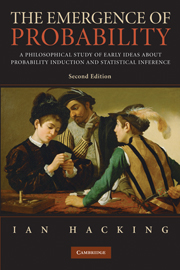 The Emergence of Probability
The Emergence of Probability Book contents
- Frontmatter
- Contents
- Introduction 2006
- 1 An absent family of ideas
- 2 Duality
- 3 Opinion
- 4 Evidence
- 5 Signs
- 6 The first calculations
- 7 The Roannez circle (1654)
- 8 The great decision (1658?)
- 9 The art of thinking (1662)
- 10 Probability and the law (1665)
- 11 Expectation (1657)
- 12 Political arithmetic (1662)
- 13 Annuities (1671)
- 14 Equipossibility (1678)
- 15 Inductive logic
- 16 The art of conjecturing (1692[?] published 1713)
- 17 The first limit theorem
- 18 Design
- 19 Induction (1737)
- Bibliography
- Index
8 - The great decision (1658?)
Published online by Cambridge University Press: 05 April 2013
- Frontmatter
- Contents
- Introduction 2006
- 1 An absent family of ideas
- 2 Duality
- 3 Opinion
- 4 Evidence
- 5 Signs
- 6 The first calculations
- 7 The Roannez circle (1654)
- 8 The great decision (1658?)
- 9 The art of thinking (1662)
- 10 Probability and the law (1665)
- 11 Expectation (1657)
- 12 Political arithmetic (1662)
- 13 Annuities (1671)
- 14 Equipossibility (1678)
- 15 Inductive logic
- 16 The art of conjecturing (1692[?] published 1713)
- 17 The first limit theorem
- 18 Design
- 19 Induction (1737)
- Bibliography
- Index
Summary
Pascal's wager (le pari de Pascal) is the name given to some game-theoretic considerations that concern belief in God. They were intended as a contribution to apologetics, and became very widely known as such. But these fragments in the Pensées had an important byproduct: they showed how aleatory arithmetic could be part of a general ‘art of conjecturing’. They made it possible to understand that the structure of reasoning about games of chance can be transferred to inference that is not founded on any chance set-up.
The wager is not easy to understand. Logicians have dismissed it. They have been mistaken. Pascal's pages contain three distinct arguments. Each is valid. Each has the form of a decision-theoretic argument of a sort properly classified and characterized only in this century. Although Pascal did not state his underlying principles, it seems clear that he did know what he was doing. The reasoning was novel, but the popularity of the Pensées made it a familiar fact that games of chance could serve as models for other problems about form of decision under uncertainty.
The wager occurs in a passage headed infini – rien, no. 418 in Lafuma's numeration, and 233 in Brunschvicg's. It consists of two pieces of paper covered on both sides by handwriting going in all directions. It is full of erasures, corrections, and seeming afterthoughts. For a photograph, see Brunet [1956]. There is endless speculation about when and how Pascal wrote these two pages.
- Type
- Chapter
- Information
- The Emergence of ProbabilityA Philosophical Study of Early Ideas about Probability, Induction and Statistical Inference, pp. 63 - 72Publisher: Cambridge University PressPrint publication year: 2006
